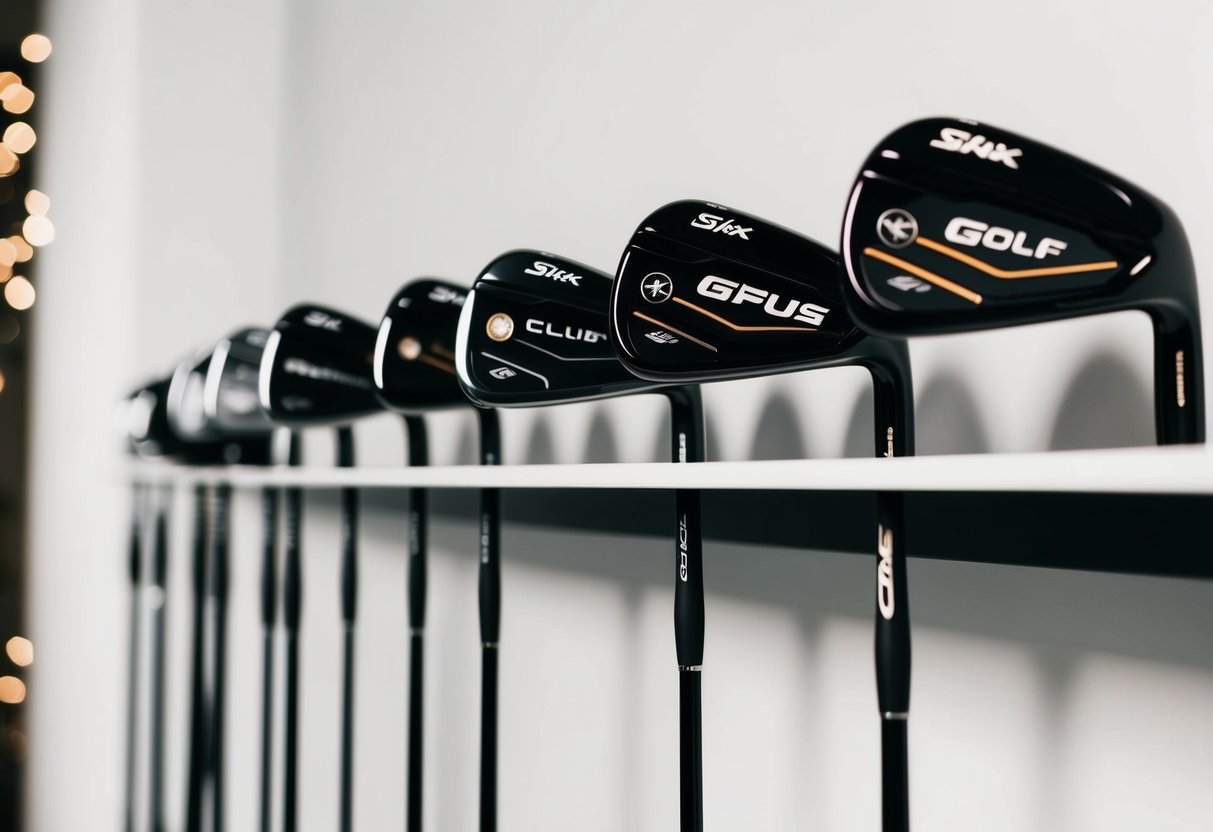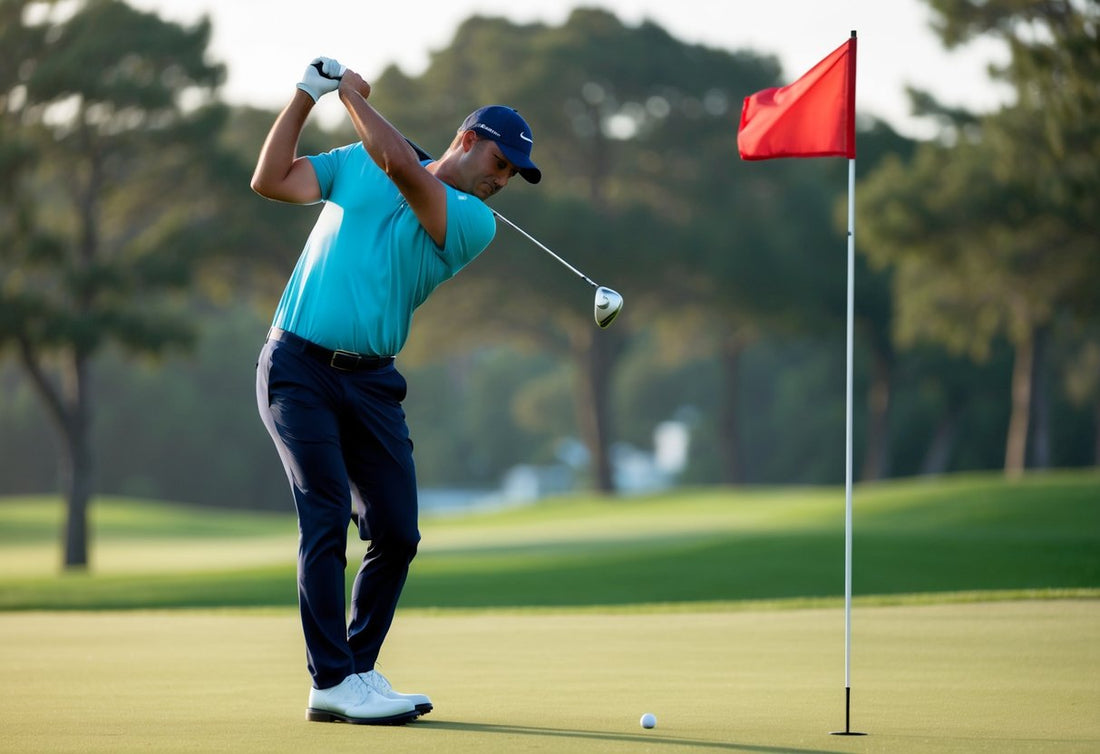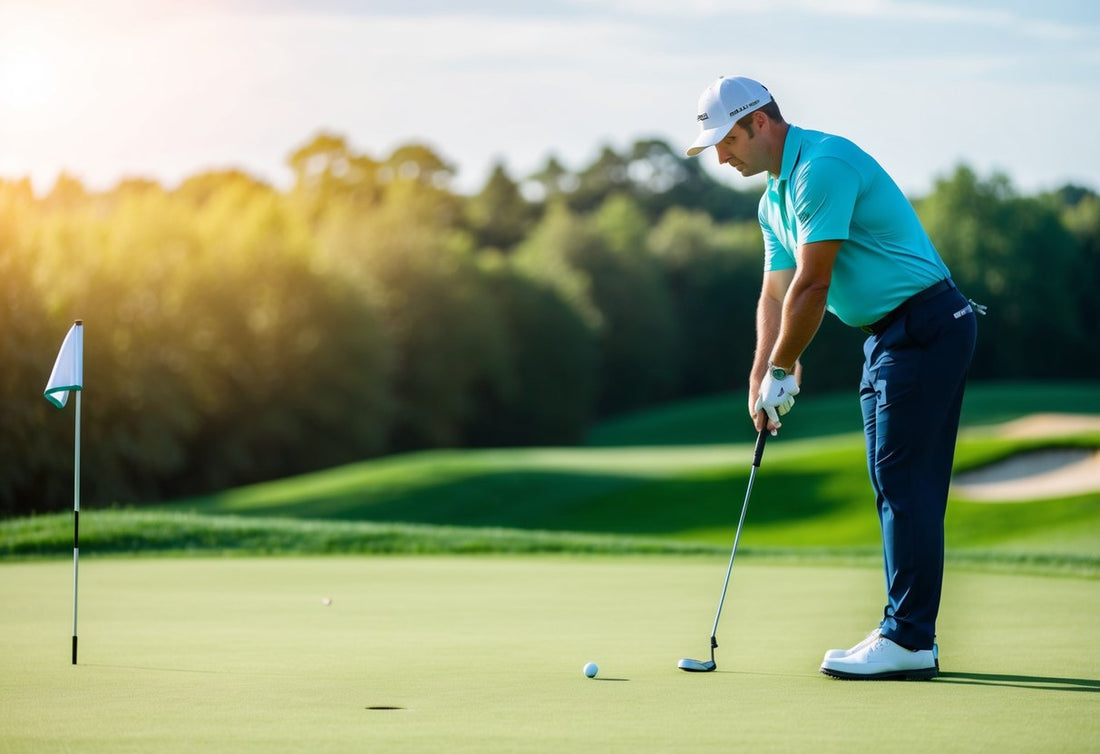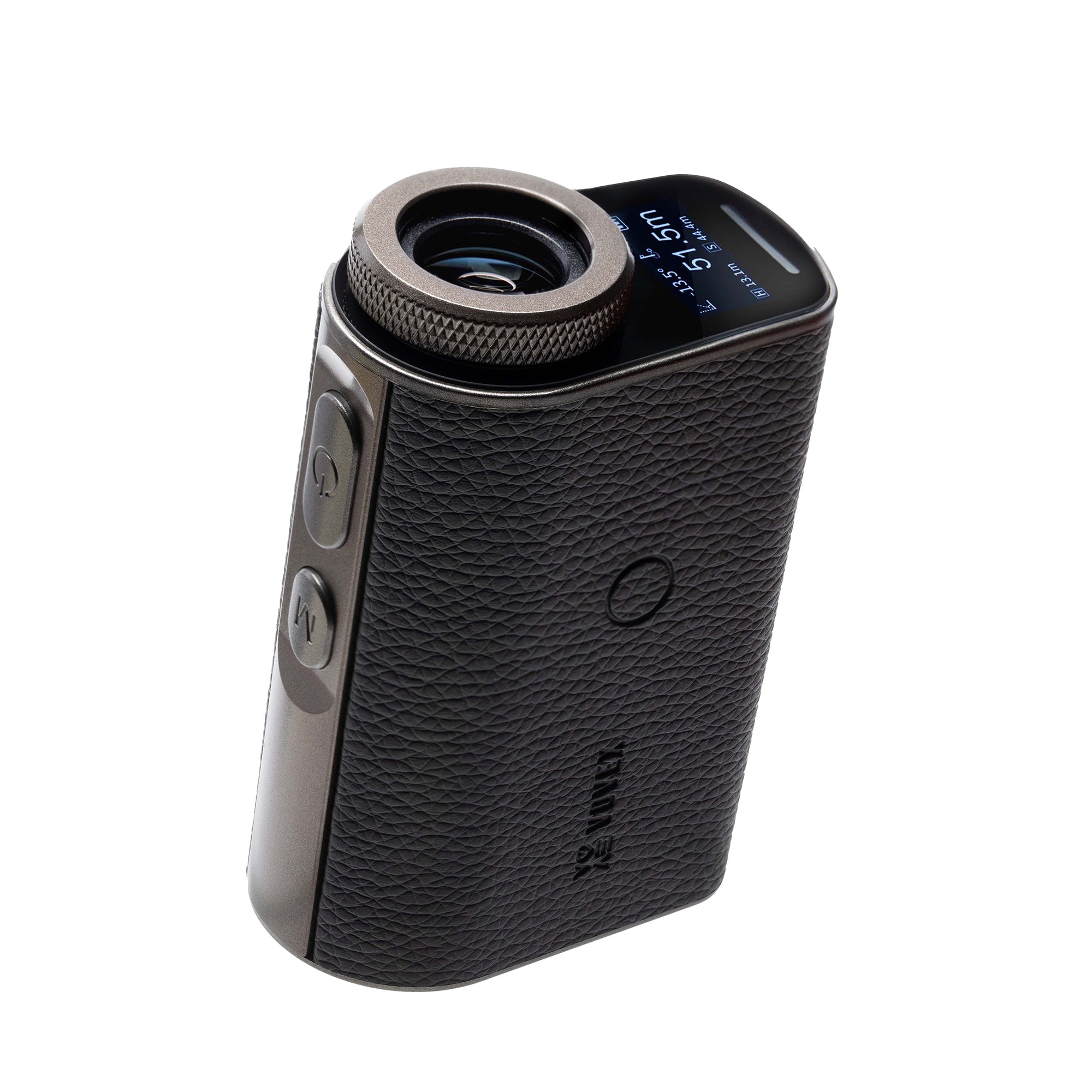Check out our golf rangefinders by Vovex to elevate your game!
Golf club selection can make or break your game. The right clubs can enhance your performance, while the wrong ones may hinder your progress. Top manufacturers like Titleist, TaylorMade, and Callaway consistently produce high-quality golf clubs that cater to players of all skill levels.
We've spent countless hours testing and comparing golf clubs from various brands to help you make an informed decision. Our research has shown that factors such as material quality, design innovation, and custom fitting options play crucial roles in determining the best golf clubs for individual players.
Whether you're a beginner looking for your first set or a seasoned pro seeking an upgrade, we've got you covered. Let's explore the world of golf clubs and find the perfect match for your swing.
Key Takeaways
- Top brands like Titleist, TaylorMade, and Callaway offer high-quality golf clubs for all skill levels
- Custom fitting is essential for optimal performance and can significantly improve your game
- Regular maintenance and staying informed about new technologies can help maximize your golf club investment
History of Golf Club Manufacturers
The evolution of golf club manufacturing has shaped the game we know today. Innovation and craftsmanship have driven the industry forward, creating clubs that enhance performance and enjoyment for players of all skill levels.
Iconic Brands in Golf History
Forgan of St Andrews, founded in 1860, is widely recognized as the world's oldest golf club manufacturer. They pioneered many early innovations in club design. In the early 20th century, brands like Spalding and MacGregor rose to prominence, introducing steel shafts and other advancements.
Wilson Staff emerged in the 1930s, quickly becoming a dominant force in the golf world. Their clubs were used to win numerous major championships. Ping, founded by Karsten Solheim in 1959, revolutionized putter design with their iconic Anser model.
Callaway burst onto the scene in the 1980s with their oversized Big Bertha drivers, changing the face of golf club design forever. TaylorMade, founded in 1979, became known for their metal woods and continues to be a leader in club technology.
Advancements in Club Technology
The shift from wooden clubs to metal heads marked a significant turning point in golf club manufacturing. This change allowed for larger sweet spots and increased forgiveness on off-center hits.
In the 1970s, investment casting techniques enabled more complex club head designs. This led to the development of cavity-back irons, which improved performance for amateur golfers.
The introduction of titanium in the 1990s allowed for even larger driver heads, further increasing forgiveness and distance. Multi-material construction became popular, with manufacturers combining materials like carbon fiber and tungsten to optimize weight distribution and performance.
Adjustable clubs emerged in the 2000s, allowing players to fine-tune their equipment. Today, computer-aided design and 3D printing are pushing the boundaries of what's possible in golf club manufacturing.
Evaluating Golf Club Quality
Assessing the quality of golf clubs involves examining multiple factors. We'll explore the key elements that determine club performance and player satisfaction.
Material and Construction
Golf club materials significantly impact performance. Clubheads often use titanium, stainless steel, or carbon composite. Titanium offers lightweight strength, while stainless steel provides durability and affordability. Carbon composite allows for weight redistribution, enhancing forgiveness.
Shaft materials include steel and graphite. Steel shafts offer precision and feedback, favored by skilled players. Graphite shafts are lighter, enabling faster swing speeds and reducing vibration.
Construction techniques matter too. Forged irons offer better feel and workability, preferred by low-handicap players. Cast clubs are more forgiving, suiting a wider range of golfers.
Performance Metrics
We measure club performance through various metrics. Launch angle indicates the initial trajectory of the ball, affecting distance and accuracy. Spin rate influences ball flight and control, especially important for approach shots and putting.
Ball speed off the clubface correlates directly with distance. Higher ball speeds typically result in longer shots. Moment of inertia (MOI) measures a club's resistance to twisting, with higher MOI clubs offering more forgiveness on off-center hits.
Smash factor, the ratio of ball speed to clubhead speed, indicates energy transfer efficiency. A higher smash factor suggests better performance.
Player Feedback and Reviews
Professional and amateur golfer reviews provide valuable insights into club quality. We consider factors like feel, sound at impact, and overall satisfaction. Player feedback often highlights club forgiveness, distance gains, and shot-shaping abilities.
Tour player usage can indicate club quality, though individual preferences vary. Some pros stick with familiar brands, while others experiment with new technology.
Online forums and golf communities offer a wealth of user experiences. These real-world tests complement manufacturer claims and professional reviews. We look for consistent praise or criticism across multiple sources to gauge true club performance.
Leading Golf Club Brands
The golf equipment market features several top brands known for their quality, innovation, and performance. These companies consistently produce clubs that help golfers improve their game.
Callaway Golf
Callaway is a leader in golf club technology. We've seen them pioneer materials like carbon fiber in their drivers. Their Big Bertha line revolutionized driver design in the 1990s.
Callaway's irons are popular among pros and amateurs alike. The Apex and Mavrik series offer options for various skill levels. Their wedges, like the Jaws MD5, are known for precision around the greens.
The company also owns Odyssey, a top putter brand. Odyssey's White Hot insert technology has been a staple in their putters for years.
TaylorMade Golf
TaylorMade is renowned for its drivers and woods. We've watched their adjustable loft technology become an industry standard. The M series and SIM drivers have been game-changers for many golfers.
Their P-series irons cater to skilled players, while the M-series offers more forgiveness. TaylorMade's Spider putters have gained a strong following on professional tours.
The company invests heavily in R&D, often introducing new technologies each season. Their partnership with top pros like Tiger Woods and Rory McIlroy boosts their visibility.
Titleist
Titleist is synonymous with premium golf equipment. We've seen their Pro V1 ball dominate professional tours for decades. Their clubs maintain a similar reputation for quality.
The T-series irons blend forgiveness and workability for various player types. Their Vokey wedges are a favorite among tour pros for their spin and control.
Titleist's drivers, like the TSi series, have gained popularity in recent years. Their Scotty Cameron putters are considered some of the finest in golf.
PING
PING has a long history of innovation in golf club design. We appreciate their focus on custom fitting to match clubs to a golfer's swing. Their color-coded lie angle system has been an industry standard for years.
PING's G-series drivers and irons are known for forgiveness and distance. The i-series irons cater to more skilled players seeking workability. Their Anser putters have been a staple in golf for decades.
The company's commitment to engineering is evident in their consistent product quality.
Cobra Golf
Cobra has made significant strides in recent years. We've seen them push boundaries with designs like their single-length irons. Their drivers, like the RADSPEED, compete with the best in distance and forgiveness.
Cobra's partnership with Rickie Fowler has boosted their visibility among younger golfers. Their F-MAX line caters specifically to players with moderate swing speeds.
The company has also embraced technology, incorporating features like built-in shot tracking in some models.
Custom Fitting for Optimal Performance
We've found that custom fitting is crucial for maximizing golf club performance. It's not just about choosing a brand - it's about finding clubs tailored to your unique swing.
Custom fitting involves analyzing your swing characteristics, body measurements, and playing style. Factors like club length, lie angle, shaft flex, and grip size are all adjusted to match your needs.
Many top manufacturers offer fitting services. These sessions typically include high-tech analysis tools like launch monitors and motion capture systems. They provide detailed data on your swing and ball flight.
The benefits of custom fitting are significant:
- Improved accuracy and consistency
- Increased distance
- Better feel and comfort
- Reduced risk of injury
While custom fitting may cost extra, we believe it's a worthwhile investment. It can lead to lower scores and more enjoyment on the course.
Remember, even the best clubs won't perform optimally if they don't suit your individual needs. That's why we always recommend getting fitted before making a purchase.
Innovation and Design Trends in Golf Clubs
Golf club technology has come a long way in recent years. We've seen exciting advancements that are changing the game for players of all skill levels.
One major trend is the use of AI in club design. Manufacturers are harnessing machine learning to optimize club shapes and materials for maximum performance.
Adjustable clubs have also gained popularity. These allow golfers to fine-tune loft, lie angle, and weight distribution to suit their swing and course conditions.
Materials innovation:
- Carbon fiber composites
- Titanium alloys
- Tungsten weighting
These cutting-edge materials help create clubs that are lighter, stronger, and more forgiving than ever before.
We're also seeing a focus on personalization. Many brands now offer custom fitting services to ensure golfers get clubs tailored to their unique needs.
3D printing is another game-changer. It enables rapid prototyping and the creation of complex internal structures that were previously impossible to manufacture.
Smart clubs with embedded sensors are starting to emerge. These can provide real-time feedback on swing mechanics and ball flight data.
Sustainability is becoming a priority too. Some manufacturers are exploring eco-friendly materials and production methods to reduce their environmental impact.
As technology continues to evolve, we can expect even more exciting innovations in golf club design in the coming years.
Price Versus Performance
Golf club pricing varies widely, with performance often correlating to cost. We've found that budget-friendly options can offer good value, while high-end models typically provide cutting-edge technology and premium materials.
Budget-Friendly Options
Many brands offer quality clubs at affordable prices. Wilson and Tour Edge stand out for their budget-friendly options that don't skimp on performance. We've tested Wilson's D9 irons and found they provide excellent distance and forgiveness for under $700 per set.
Tour Edge's Hot Launch series impresses with its game-improvement features at a wallet-friendly price point. These clubs often incorporate technologies that were cutting-edge just a few years ago, making them a smart choice for beginners and intermediate players.
High-End Models
Premium brands like Titleist, TaylorMade, and Callaway dominate the high-end market. Their flagship models showcase the latest innovations in golf club design. We've seen that TaylorMade's P790 irons, priced around $1,400, offer exceptional feel and distance control.
Titleist's TSi drivers, while pricey at $550+, deliver unmatched consistency and ball speed. High-end clubs often feature advanced materials like carbon fiber and tungsten, contributing to their superior performance. For serious golfers looking to maximize their game, these top-tier options can be worth the investment.
Golf Clubs for Different Skill Levels
Selecting the right golf clubs can significantly impact a player's performance and enjoyment of the game. We'll explore club options tailored to various skill levels, helping golfers make informed choices.
Beginners
For those new to golf, forgiving clubs are essential. We recommend oversized club heads with perimeter weighting to increase the sweet spot. Game improvement irons with wide soles help prevent digging into the turf.
Cavity-back irons offer more forgiveness on off-center hits. A high-lofted driver (10.5 to 12 degrees) can help beginners get the ball airborne more easily.
We suggest a basic set including:
- A driver
- 5-wood
- 5-hybrid
- 6-iron through pitching wedge
- Sand wedge
- Putter
Brands like Callaway, TaylorMade, and Cobra offer excellent beginner-friendly options.
Intermediate Players
As skills improve, players can transition to clubs that offer a balance of forgiveness and control. We recommend considering:
- Drivers with adjustable loft and weight settings
- Fairway woods with smaller heads for improved shot-shaping
- Game improvement or players' distance irons
- Wedges with various bounce options
Intermediate players might benefit from:
- A 3-wood or 5-wood
- 4-hybrid
- 5-iron through gap wedge
- Sand and lob wedges
- Mid-mallet putter
Brands like Ping, Titleist, and Mizuno offer great options for this skill level.
Advanced Golfers
Experienced players often prefer clubs that prioritize workability and feel over forgiveness. We recommend:
- Lower-lofted drivers (9 to 10.5 degrees) for optimal distance
- Compact irons with less offset for precise shot-shaping
- Forged wedges for enhanced spin control
- Blade-style putters for maximum feel
Advanced players might opt for:
- Driver
- 3-wood
- 2-iron or driving iron
- 3-iron through pitching wedge
- Gap, sand, and lob wedges
- Blade putter
Top choices include clubs from Titleist, TaylorMade, and Mizuno's professional lines.
Where to Purchase Golf Clubs
Golf enthusiasts have several options when it comes to buying clubs. We'll explore the main avenues for finding the perfect set, from online retailers to local pro shops and second-hand markets.
Online Retailers
Online shopping offers convenience and a wide selection of golf clubs. Major e-commerce platforms like Amazon and eBay feature extensive catalogs from various brands. Specialized golf retailers such as Golf Galaxy and PGA Tour Superstore provide expert advice and customization options through their websites.
We've found that online stores often run promotions and discounts, making high-end clubs more affordable. Many sites offer detailed product descriptions, customer reviews, and comparison tools to help golfers make informed decisions.
It's crucial to check return policies and warranties when buying online. Some retailers offer virtual fitting sessions to ensure the clubs match your swing and playing style.
Local Pro Shops
Pro shops at golf courses and driving ranges provide a hands-on experience for club buyers. We appreciate the personalized service and expert advice from PGA professionals who staff these shops.
Trying clubs before purchase is a significant advantage of shopping at pro shops. Many offer fitting services to fine-tune club specifications to your body type and swing.
Pro shops often carry premium brands and may have exclusive deals with certain manufacturers. While prices might be higher than online retailers, the value of professional guidance and immediate availability can outweigh the cost difference for many golfers.
Second-Hand Markets
For budget-conscious golfers or those looking for rare or discontinued models, second-hand markets are treasure troves. Online platforms like Global Golf and 2nd Swing specialize in pre-owned clubs, offering certified refurbished options.
Local golf shops sometimes have trade-in programs, allowing golfers to find gently used clubs at discounted prices. We've noticed that many high-quality clubs become available as enthusiasts upgrade their sets.
Auction sites and golf forums can be great sources for unique finds. When buying used clubs, it's essential to inspect for wear and damage. Some sellers offer warranties on second-hand clubs, providing peace of mind for buyers.
Maintaining Your Golf Clubs
Proper maintenance is crucial for keeping our golf clubs in top condition. Regular cleaning after each round prevents dirt and debris from accumulating and potentially damaging the equipment.
We recommend using warm, soapy water and a soft brush to gently clean the clubheads. For stubborn dirt, a specialized golf club cleaner can be effective.
Don't forget about the grips! Wiping them down with a damp cloth helps maintain tackiness and prevents slipping during swings.
Storing clubs in a cool, dry place protects them from moisture and temperature fluctuations. A high-quality golf bag offers additional protection during transport and storage.
Periodically checking for loose clubheads or damaged shafts is essential. If we notice any issues, it's best to have them addressed by a professional club fitter or repair specialist.
For wooden clubs, applying a thin coat of wax every few months helps preserve the finish and protect against moisture.
Here's a quick maintenance checklist:
- Clean clubheads and grips after each round
- Dry thoroughly before storing
- Check for loose components regularly
- Store in a cool, dry place
- Apply wax to wooden clubs periodically
Frequently Asked Questions
Many golfers wonder about the top brands, how to choose clubs, and which options offer the best value. Let's address some common questions about golf club selection and quality.
What brands are considered top-tier for professional golfers?
TaylorMade, Titleist, and Callaway are often regarded as top-tier brands for pros. These companies invest heavily in research and development to create clubs that meet the exacting standards of tour players.
How do I choose the best golf clubs for my skill level?
We recommend getting fitted by a professional. They'll assess your swing and recommend clubs that match your playing style. Beginners might benefit from more forgiving clubs, while advanced players may prefer clubs offering greater control.
What are some golf club brands beginners should consider?
Cleveland, Cobra, and Wilson offer excellent options for newcomers. These brands produce clubs with larger sweet spots and more forgiveness, helping beginners improve their game.
Which golf clubs do the majority of tour players prefer?
TaylorMade and Titleist dominate on professional tours. Many top players use a mix of clubs from these brands, often customized to their specifications.
What factors determine the highest quality in golf clubs?
Materials, design, and manufacturing precision are key. High-quality clubs use premium metals, have optimized weight distribution, and undergo rigorous testing to ensure consistency and performance.
Can you recommend golf clubs that offer great value for average players?
Ping and Mizuno offer excellent value for mid-range players. These brands combine quality craftsmanship with reasonable prices, providing a good balance of performance and affordability.






